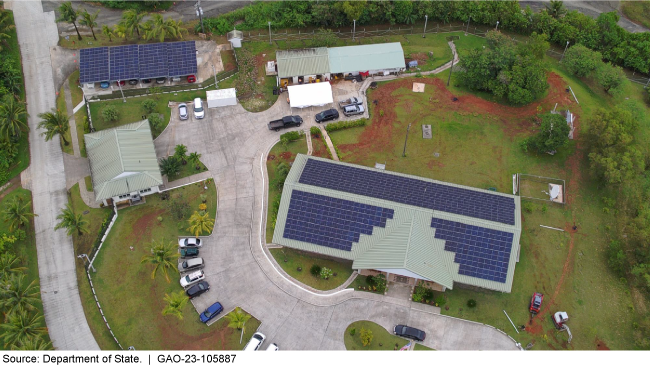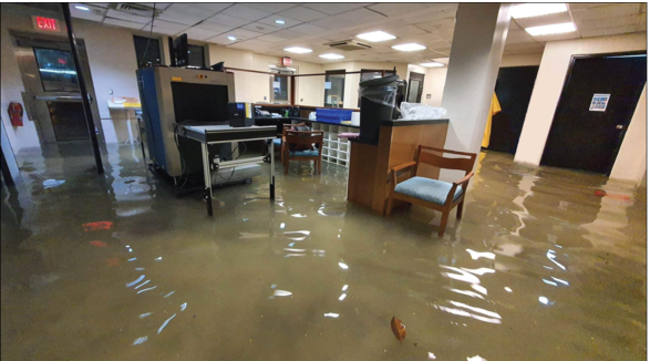Overseas Real Property: State Has Not Aligned Natural Hazard Resilience Plans to Staffing Levels
Fast Facts
According to the State Department, natural hazards—including those intensified by climate change such as flooding or extreme wind—threaten more than 290 of its overseas posts, including embassies and consulates.
State is analyzing risks and working to make its facilities more resilient to natural hazards. For example, it has improved buildings and updated design standards to include new hazard information. But officials said they don't have enough staff to carry out all of their planned efforts.
We recommended that State align its climate resilience plans and staffing to more clearly establish how it will support its facility resilience goals.
Installing solar panels on U.S. posts, such as this embassy in Palau, is an example of a climate resilience project

Highlights
What GAO Found
The Department of State's Bureau of Overseas Buildings Operations (OBO) has taken steps to address natural hazard risks at overseas facilities by incorporating structural improvements and analyzing and evaluating ongoing risks. OBO's construction, repair, and leasing processes help enhance the natural hazard resilience of its overseas facilities. For example, OBO's construction design standards incorporate resilience considerations from industry-recognized building codes. In addition, OBO's prioritization process for repair projects includes natural hazard risks among selection criteria. GAO also found that OBO updated some design standards and construction processes to integrate new information on natural hazards, such as flooding (see figure).
Flooding of the US. Embassy in Manila, Philippines in August 2022

Source: Department of State | GAO-23-105887
In 2020, OBO created the Climate Security and Resilience program to help identify current and projected natural hazard risks at U.S. embassies and consulates. OBO is also taking steps to integrate natural hazard risk and resilience into its policies and processes for managing its assets.
According to OBO, the Climate Security and Resilience program does not have adequate staff to complete all planned program efforts in support of State's climate resilience priorities. A workforce analysis prepared by OBO's contractor recommended that OBO increase program staffing from about four to 11 positions to meet the expected demands of the program, such as helping posts identify recommended hazard resilience projects. State requested additional staff for OBO as part of the fiscal year 2024 budget process. However, OBO has yet to determine how it will allocate staff across its competing programs and priorities. By aligning program plans with the staffing level State provides, State and OBO can more clearly establish how the program can support State's climate resilience goals for its overseas properties.
Why GAO Did This Study
Climate change and increasingly frequent and extreme weather events have caused a surge in global natural disasters over the past 50 years, according to the World Meteorological Organization. State has concluded that natural hazards pose a threat to the missions and personnel at over 290 U.S. overseas posts valued at about $70 billion. GAO was asked to review State's efforts to address natural hazard risks to its facilities, including risks exacerbated by climate change, and the challenges associated with these efforts.
This report examines: (1) steps State has taken to enhance natural hazard resilience of its facilities overseas, (2) State's efforts to identify and incorporate natural hazard risk into its resilience plans, and (3) the extent to which State's resources align with planned resilience efforts. GAO reviewed State documents, natural hazard risk assessment data, and OBO funding or budget information from 2019 through 2024. GAO also interviewed State officials and staff at four posts selected for their high exposure to natural hazards.
Recommendations
GAO recommends that the Secretary of State ensure that OBO adjust its Climate Security and Resilience program plans to reflect department decisions on program staffing levels, as appropriate. State concurred with GAO's recommendation.
Recommendations for Executive Action
| Agency Affected | Recommendation | Status |
|---|---|---|
| Department of State |
Priority Rec.
The Secretary of State should ensure that the Director of OBO, following the final staffing and resource decisions based on the agency's fiscal year 2024 appropriations, revisits the Climate Security and Resilience Program plans, including goals and timeframes, and adjusts the plans as appropriate. (Recommendation 1) |
State concurred with our recommendation. In December 2024, agency officials informed us that State continues to pursue hiring five additional staff for the Bureau of Overseas Building Operations (OBO) Climate Security and Resilience (CS&R) Program. OBO hired four contract staff for the CS&R program during 2024. OBO officials stated that both current and future staff positions will adequately support program plans adjusted by the CS&R program to reflect staffing resources. In January 2025, the President issued a Presidential Memorandum freezing the hiring of federal civilian employees. OBO also modified the name of the program to Natural Hazards Adaptation Program (NHA). We will continue to monitor State's actions to adequately resource its NHA program and adjust the program's plans based on available resources.
|
